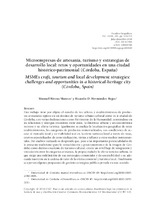Mostrar el registro sencillo del ítem
Microempresas de artesanía, turismo y estrategias de desarrollo local: retos y oportunidades en una ciudad histórico-patrimonial (Córdoba, España)
| dc.contributor.author | Rivera Mateos, Manuel | |
| dc.contributor.author | Hernández Rojas, Ricardo David | |
| dc.date.accessioned | 2019-02-12T08:59:08Z | |
| dc.date.available | 2019-02-12T08:59:08Z | |
| dc.date.issued | 2018 | |
| dc.identifier.uri | http://hdl.handle.net/10396/17821 | |
| dc.description.abstract | Este trabajo tiene por objeto el estudio de los talleres y establecimientos de productos artesanales típicos en un destino de turismo urbano cultural como es la ciudad de Córdoba, con varias declaraciones como Patrimonio de la Humanidad, centrándose en las relaciones y sinergias existentes entre estos, la dinámica urbana y socioeconómica reciente y su oferta turística. Igualmente se analiza la localización geográfica de estos establecimientos, las categorías de productos comercializados, sus condiciones de acceso al mercado local y su visibilidad real en la oferta turística local a través de rutas, centros especializados de comercialización, visitas a talleres u otros medios instrumentales. Del análisis realizado se desprende que, pese a las importantes potencialidades de la artesanía tradicional para la consolidación y posicionamiento de la imagen de Córdoba como destino excelente de turismo cultural, existe un nivel bajo de integración y vinculación entre los negocios artesanos, la propia ciudad y la oferta turística urbana, lo que exige una redefinición de sus estrategias comerciales y de sostenibilidad y su adecuada inserción en la cadena de valor de la oferta comercial y turística local. Finalmente se aportan algunas propuestas de gestión estratégica público-privada en este sentido. | es_ES |
| dc.description.abstract | This paper aims at studying workshops and establishments specialized on typical handcraft products in an urban touristic destination such as Córdoba. The study focuses on the synergies and connections of those with its recent urban and socioeconomic dynamics and the tourist activity of the city. In the same way it is analyzed the geographic location of those establishments, the categories of the marketed products and its real visibility in the local touristic offer through different routes, specialized establishments, visits to different workshops and other channels. From the analysis carried out, we infer that despite the important potentials of the traditional handicraft for the consolidation and positioning of Cordoba as an excellent cultural tourist destination, there is low integration or link between handicraft businesses, the city and the urban touristic offer. This requires a redefinition of its commercial and sustainable strategies and an adequate inclusion into the value chain of the touristic and commercial offer of the city. Finally, some proposals of public-private strategic management are provided | es_ES |
| dc.format.mimetype | application/pdf | es_ES |
| dc.language.iso | spa | es_ES |
| dc.publisher | CSIC | es_ES |
| dc.rights | https://creativecommons.org/licenses/by-nc-nd/4.0/ | es_ES |
| dc.source | Estudios Geográficos LXXIX (285), 529-553 (2018) | es_ES |
| dc.subject | Artesanía | es_ES |
| dc.subject | Turismo | es_ES |
| dc.subject | Microempresas | es_ES |
| dc.subject | Desarrollo local | es_ES |
| dc.subject | Córdoba (España) | es_ES |
| dc.subject | Crafts | es_ES |
| dc.subject | Tourism | es_ES |
| dc.subject | Micro-enterprises | es_ES |
| dc.subject | Local development | es_ES |
| dc.title | Microempresas de artesanía, turismo y estrategias de desarrollo local: retos y oportunidades en una ciudad histórico-patrimonial (Córdoba, España) | es_ES |
| dc.title.alternative | MSMEs craft, tourism and local development strategies: challenges and opportunities in a historical-heritage city (Córdoba, Spain) | es_ES |
| dc.type | info:eu-repo/semantics/article | es_ES |
| dc.relation.publisherversion | https://doi.org/10.3989/estgeogr.201820 | es_ES |
| dc.rights.accessRights | info:eu-repo/semantics/openAccess | es_ES |

